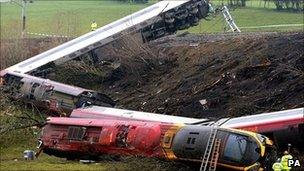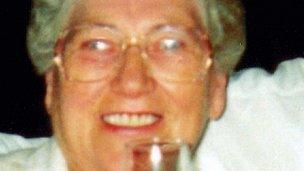Network Rail indicates guilty plea over Grayrigg crash
- Published

The train derailed while travelling over the points at 92mph
Network Rail is to admit health and safety breaches over the Grayrigg crash in Cumbria in which a woman died and more than 80 people were hurt.
Margaret Masson, 84, from Glasgow, died after the Virgin train derailed on the West Coast Main Line near the village of Grayrigg.
Appearing at Lancaster Magistrates' Court, Network Rail (NR) indicated it would admit health and safety breaches.
The case will now be heard at Preston Crown Court, where NR will face a fine.
NR also apologised to Mrs Masson's family.
In November, an inquest jury found poorly-maintained points were to blame for causing her death.
'There were faults'
The train went over a "degraded" set of points at 92mph and careered down an embankment, leaving 88 people injured, including two members of the train crew.
David Higgins, Network Rail chief executive, said it was obvious the company was to blame within hours of the crash.
He said: "The Grayrigg derailment resulting in the tragic death of Mrs Masson was a terrible event.

Margaret Masson died of her injuries almost three hours after the crash
"Within hours of the event it was clear that we were responsible, that the infrastructure was at fault, so it is right that we plead guilty.
"We again apologise to Mrs Masson's family for the undoubted grief this has caused them.
"While there were faults at hand in 2007, we have been determined to recognise what we got wrong and put it right."
After the hearing Mrs Masson's son, George, 62, an engineer of Castlemilk, Glasgow, said: "I knew from day one they would be guilty.
"I'm relieved they have admitted it, but sad they could not apologise face to face, not just through the media.
"My heart has deteriorated so much since all this, the stress and anxiety. Tears welled up when I was sat in court, just the mention of my mum.
"I'm happy this will come to an end now, it's taken five long years."
The criminal proceedings were brought by the Office of Rail Regulation.
Network Rail, which is responsible for track maintenance, is facing charges under the Health and Safety at Work Act and the case was adjourned until 2 April.
Stretcher bars holding the moveable rails a set distance apart failed, causing the train to derail, an earlier hearing heard.
Mr Higgins added: "Since the accident, much has changed in the way we plan and carry out maintenance work with new systems put in place to improve the quality and safety of our railway."
- Published4 November 2011